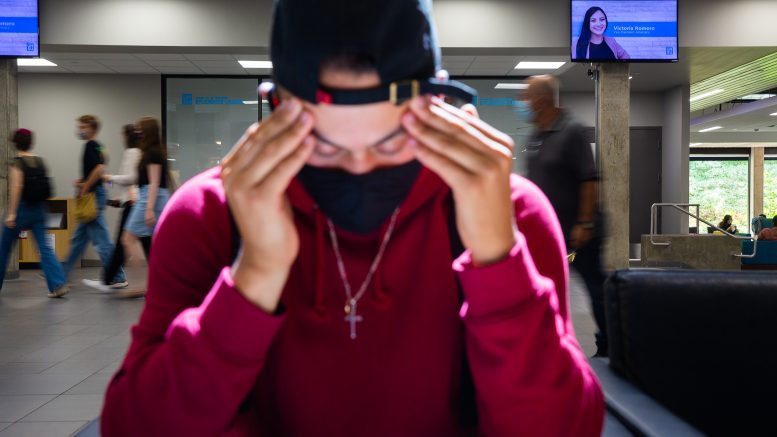The University of Manitoba will see a full return to in-person learning this fall after the COVID-19 pandemic closed campus doors, forcing students into online learning. During this two year period, Canadians’ mental health suffered greatly.
According to Statistics Canada, reports of high self-rated mental health (excellent mental health) from Canadians aged 12 and older decreased from 64 per cent to 58 per cent. People aged 18 to 34 reported the lowest levels among all age groups with only 51 per cent.
Statistics also showed that screen time and cannabis consumption increased.
Corey Mackenzie, a clinical psychology professor at the U of M, said that this year’s student body may feel more stress when attending classes than students in previous years. He said some students will be anxious to enter large lecture halls for the first time in two years, while many first and second-year students will have the added stress of entering a university classroom for the first time.
Additionally, uncertainty over how exactly a return to in-person learning will look like could lead to students dealing with their stress in different ways.
Risky substance use and excessive consumption of negative content through social media, also known as “doom scrolling,” are unhealthy, short-term tactics that Mackenzie said people adopt to suppress and distract themselves from stress.
He explained that being more open to those emotions, as well as having self-compassion and not being overly critical of oneself are healthier coping mechanisms.
“It’s going to be stressful, it’s going to be anxiety provoking, and that’s okay,” Mackenzie said.
In the classroom, Mackenzie said that he expects learning outcomes to vary for each person. He noted that chronic levels of stress may affect students’ sleep and memory, and that a dip in grades may be a sign that a student is not handling stress positively.
Students are not the only people to experience stress and anxiety. Mackenzie pointed out that everyone across the U of M community, including faculty members and administration, live with mental health challenges. He noted five attributes he thinks are important to having “good” mental health.
“Good mental health looks like something that’s some- times referred to as cognitive flexibility,” Mackenzie said.
“One is opening up to difficult emotions that arrive. A second one is unhooking from challenging thoughts that people tend to get hooked by and struggle with. A third one is staying present and mindful. A fourth one has to do with keeping our values in mind, like what is it that’s important in our lives? What is it that we value? Then the fifth one is behaving in alignment with those values.”
Tips and resources
Associate professor and director of the Student Counselling Centre (SCC) David Ness shared advice similar to that of Mackenzie. He said that it is very common for students to avoid or ignore their own mental health issues like social anxiety, which in turn worsens them. Instead, Ness recommended that students gradually learn to become more understanding of their own triggers.
Ness also encouraged students to help one another. He said that if someone notices a negative change in a friend or classmate, they should approach them in a safe place and mention the signs of concern they noticed as their reason for asking about the other person’s wellbeing. He advised students to approach each other with kindness, and to respect one another’s boundaries.
“Sometimes all someone needs to do is talk to a friend and they’re fine, other times you might need a professional’s help,” Ness said.
“There’s no way to know that until you hear what’s going on for the person.”
Ness highly recommends a number of mental health resources that are free for students.
The SCC holds single person sessions and group workshops on campus. Student Services at Bannatyne campus (SSBC) offers individual, relationship and family counselling. The Indigenous Student Centre also offers student counselling. The Psychological Services Centre (PSC), a training hub for clinical psychology students, usually accepts patients for psychological assessment and psychotherapy between September and April. Spiritual Care also offers a range of services for people of different backgrounds, religions and denominations.
Psychology department head Dan Bailis is optimistic that the return to in-per- son learning will have positive ramifications for students. He is confident that all members of the U of M will feel much more integrated, even if a return brings on new anxieties and stressors.
“It is really important to be learning in a community,” Bailis said.
“There aren’t any theories out there that don’t include community as one of those basic needs, and we’ve been without it. I think that having that restored is going to make the whole thing feel whole again.”
If you or someone else is looking for mental health assistance, see the resources below:
Health Emergency (911)
Kids Help Phone (1-800-668-6868)
Canada Suicide Hotline (1-833-456-4566)
Klinic Crisis Line (204-786-8686)
Mobile Crisis Service (204-940-1781)
Manitoba Suicide Prevention and Support Line (1-877- 435-7170)
First Nations and Inuit Hope for Wellness Help Line (1-855-242-3310)

